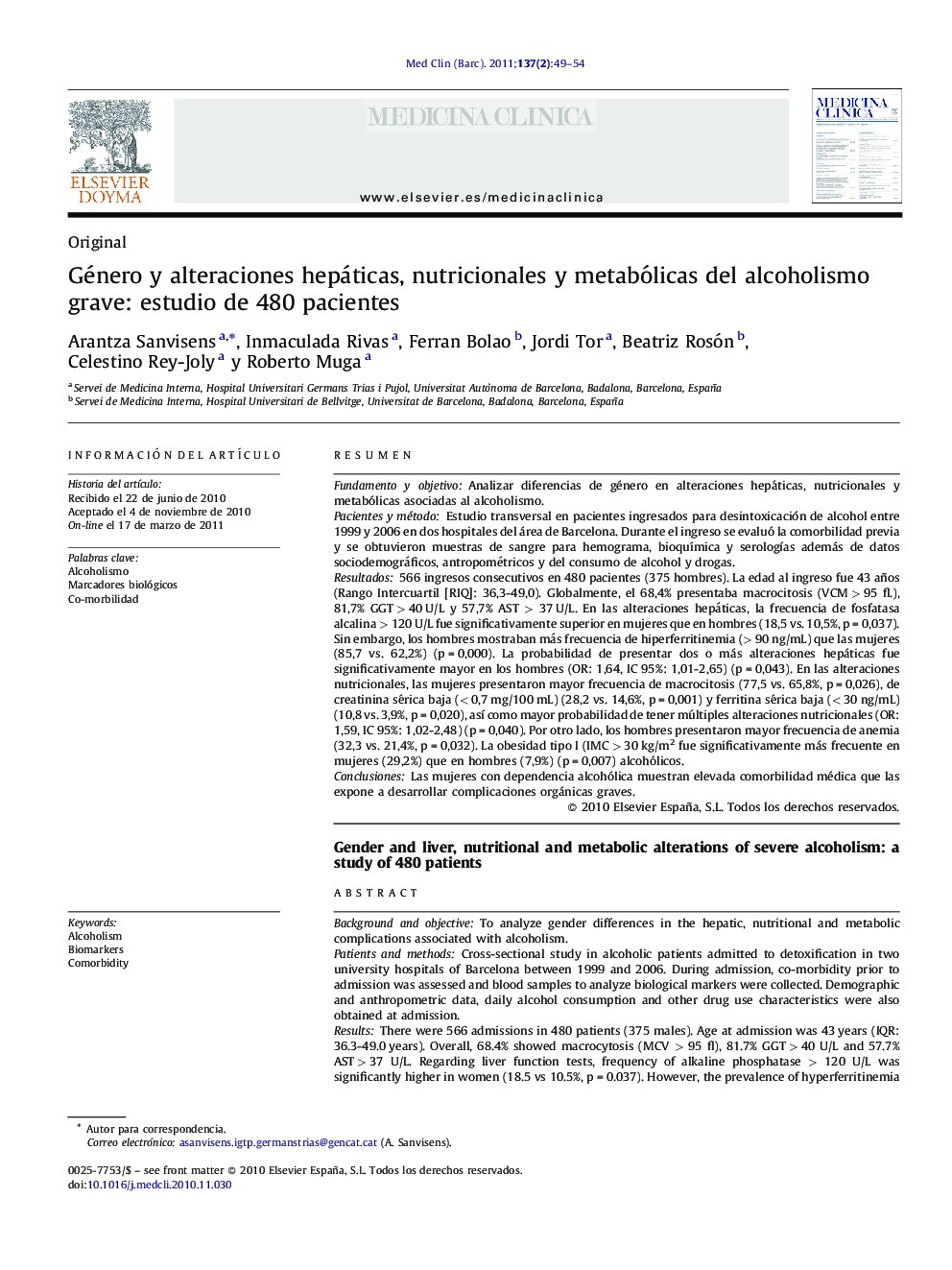| کد مقاله | کد نشریه | سال انتشار | مقاله انگلیسی | نسخه تمام متن |
|---|---|---|---|---|
| 3800221 | 1244623 | 2011 | 6 صفحه PDF | دانلود رایگان |

ResumenFundamento y objetivoAnalizar diferencias de género en alteraciones hepáticas, nutricionales y metabólicas asociadas al alcoholismo.Pacientes y métodoEstudio transversal en pacientes ingresados para desintoxicación de alcohol entre 1999 y 2006 en dos hospitales del área de Barcelona. Durante el ingreso se evaluó la comorbilidad previa y se obtuvieron muestras de sangre para hemograma, bioquímica y serologías además de datos sociodemográficos, antropométricos y del consumo de alcohol y drogas.Resultados566 ingresos consecutivos en 480 pacientes (375 hombres). La edad al ingreso fue 43 años (Rango Intercuartil [RIQ]: 36,3-49,0). Globalmente, el 68,4% presentaba macrocitosis (VCM > 95 fl.), 81,7% GGT > 40 U/L y 57,7% AST > 37 U/L. En las alteraciones hepáticas, la frecuencia de fosfatasa alcalina > 120 U/L fue significativamente superior en mujeres que en hombres (18,5 vs. 10,5%, p = 0,037). Sin embargo, los hombres mostraban más frecuencia de hiperferritinemia (> 90 ng/mL) que las mujeres (85,7 vs. 62,2%) (p = 0,000). La probabilidad de presentar dos o más alteraciones hepáticas fue significativamente mayor en los hombres (OR: 1,64, IC 95%: 1,01-2,65) (p = 0,043). En las alteraciones nutricionales, las mujeres presentaron mayor frecuencia de macrocitosis (77,5 vs. 65,8%, p = 0,026), de creatinina sérica baja (< 0,7 mg/100 mL) (28,2 vs. 14,6%, p = 0,001) y ferritina sérica baja (< 30 ng/mL) (10,8 vs. 3,9%, p = 0,020), así como mayor probabilidad de tener múltiples alteraciones nutricionales (OR: 1,59, IC 95%: 1,02-2,48) (p = 0,040). Por otro lado, los hombres presentaron mayor frecuencia de anemia (32,3 vs. 21,4%, p = 0,032). La obesidad tipo I (IMC > 30 kg/m2 fue significativamente más frecuente en mujeres (29,2%) que en hombres (7,9%) (p = 0,007) alcohólicos.ConclusionesLas mujeres con dependencia alcohólica muestran elevada comorbilidad médica que las expone a desarrollar complicaciones orgánicas graves.
Background and objectiveTo analyze gender differences in the hepatic, nutritional and metabolic complications associated with alcoholism.Patients and methodsCross-sectional study in alcoholic patients admitted to detoxification in two university hospitals of Barcelona between 1999 and 2006. During admission, co-morbidity prior to admission was assessed and blood samples to analyze biological markers were collected. Demographic and anthropometric data, daily alcohol consumption and other drug use characteristics were also obtained at admission.ResultsThere were 566 admissions in 480 patients (375 males). Age at admission was 43 years (IQR: 36.3-49.0 years). Overall, 68.4% showed macrocytosis (MCV > 95 fl), 81.7% GGT > 40 U/L and 57.7% AST > 37 U/L. Regarding liver function tests, frequency of alkaline phosphatase > 120 U/L was significantly higher in women (18.5 vs 10.5%, p = 0.037). However, the prevalence of hyperferritinemia (> 90 ng/mL) was significantly higher in alcoholic men (85.7% vs 62.2%) (p = 0.000). Having multiple liver function test alterations was significantly higher in men (OR: 1.64, 95% CI: 1.01-2.65) (p = 0.043). Women showed significant differences regarding the prevalence of macrocytosis (77.5% vs 65.8%, p = 0.026), low serum creatinine (< 0.7 mg/100 mL) (28.2 vs 14.6%, p = 0.001), low serum ferritin (< 30 ng/mL) (10.8 vs 3.9%, p = 0.020), as well as of multiple nutritional alterations (OR: 1.59, 95% CI: 1.02-2.48) (p = 0.040). However, men had higher prevalence of anemia than women (32.3 vs 21.4%, p = 0.032). Prevalence of type I obesity (BMI > 30 kg/m2) was significantly higher in alcoholic women (29.2 vs 7.9%, p = 0.007).ConclusionsHepatic, nutritional and metabolic complications of alcoholism in women are frequent, thus increasing the risk of developing adverse clinical outcomes.
Journal: Medicina Clínica - Volume 137, Issue 2, 11 June 2011, Pages 49–54